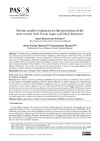Please use this identifier to cite or link to this item:
https://accedacris.ulpgc.es/jspui/handle/10553/37116
| Title: | Service quality evaluation in the perception of the wine tourist with Fuzzy Logic and Ideal Solutions | Other Titles: | Evaluación de la calidad de servicio en percepción del enoturista mediante la Lógica Borrosa y las Soluciones Ideales | Authors: | Batista de Freitas, Joao Carlos Martin, Juan Roman, Concepcion |
UNESCO Clasification: | 531290 Economía sectorial: turismo | Keywords: | Fuzzy Logic Triangular Fuzzy Numbers TOPSIS Wine tourism Satisfaction, et al |
Issue Date: | 2017 | Journal: | Pasos: revista de turismo y patrimonio cultural | Abstract: | This article solves a multidimensional problem in order to evaluate the
satisfaction of the wine tourist that visited a winery located in the
South of Brazil, employing a method based on fuzzy logic. Thus, a
synthetic index of satisfaction is calculated for a group of segments in
which we are interested, namely, gender and image prior to the visit.
The problem of linguistic ambiguity is addressed with the fuzzy sets
theory, applying triangular fuzzy numbers (TFN). The synthetic index of
satisfaction is based on the concept of the degree of optimality by the
technique of similarity of ideal solutions. The results obtained show
that the analyzed segments experienced different satisfaction. Our
results can be used by the winery directors as well as by the regional
planners and managers, in order to improve the competitiveness of this
market niche. Este artículo resuelve un problema multidimensional para evaluar la satisfacción de los enoturistas que visitaron una bodega situada en el sur de Brasil utilizando un método basado en la lógica borrosa. De esta forma, se calcula un índice sintético de satisfacción para un grupo de segmentos en los que estamos interesados, a saber, género e imagen previa a la visita. El problema de la ambigüedad lingüística se aborda desde la teoría de los conjuntos borrosos aplicando números borrosos triangulares (NBT). El indicador sintético de la satisfacción se basa en el concepto de grado de optimalidad mediante la técnica de la semejanza a las soluciones ideales. Los resultados obtenidos muestran que los segmentos analizados experimentan una distinta satisfacción. Nuestros resultados pueden usarse por los directivos de la bodega, así como por los planificadores y administradores de la región, para mejorar la competitividad de este nicho de mercado. |
URI: | https://accedacris.ulpgc.es/handle/10553/37116 | ISSN: | 1695-7121 | DOI: | 10.25145/j.pasos.2017.15.022 | Source: | Pasos: revista de turismo y patrimonio cultural [ISSN 1695-7121], v. 15 (2), p. 341-358 |
| Appears in Collections: | Artículos |
WEB OF SCIENCETM
Citations
5
checked on Jun 8, 2025
Page view(s)
154
checked on Jan 27, 2024
Download(s)
132
checked on Jan 27, 2024
Google ScholarTM
Check
Altmetric
Share
Export metadata
Items in accedaCRIS are protected by copyright, with all rights reserved, unless otherwise indicated.
